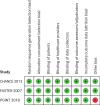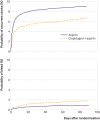Clopidogrel plus aspirin versus aspirin alone for acute minor ischaemic stroke or high risk transient ischaemic attack: systematic review and meta-analysis - PubMed (original) (raw)
Meta-Analysis
Clopidogrel plus aspirin versus aspirin alone for acute minor ischaemic stroke or high risk transient ischaemic attack: systematic review and meta-analysis
Qiukui Hao et al. BMJ. 2018.
Abstract
Objective: To assess the effectiveness and safety of dual agent antiplatelet therapy combining clopidogrel and aspirin to prevent recurrent thrombotic and bleeding events compared with aspirin alone in patients with acute minor ischaemic stroke or transient ischaemic attack (TIA).
Design: Systematic review and meta-analysis of randomised, placebo controlled trials.
Data sources: Medline, Embase, Cochrane Central Register of Controlled Trials, Cochrane Library, ClinicalTrials.gov, WHO website, PsycINFO, and grey literature up to 4 July 2018.
Eligibility criteria for selecting studies and methods: Two reviewers independently screened potentially eligible studies according to predefined selection criteria and assessed the risk of bias using a modified version of the Cochrane risk of bias tool. A third team member reviewed all final decisions, and the team resolved disagreements through discussion. When reports omitted data that were considered important, clarification and additional information was sought from the authors. The analysis was conducted in RevMan 5.3 and MAGICapp based on GRADE methodology.
Results: Three eligible trials involving 10 447 participants were identified. Compared with aspirin alone, dual antiplatelet therapy with clopidogrel and aspirin that was started within 24 hours of symptom onset reduced the risk of non-fatal recurrent stroke (relative risk 0.70, 95% confidence interval 0.61 to 0.80, I2=0%, absolute risk reduction 1.9%, high quality evidence), without apparent impact on all cause mortality (1.27, 0.73 to 2.23, I2=0%, moderate quality evidence) but with a likely increase in moderate or severe extracranial bleeding (1.71, 0.92 to 3.20, I2=32%, absolute risk increase 0.2%, moderate quality evidence). Most stroke events, and the separation in incidence curves between dual and single therapy arms, occurred within 10 days of randomisation; any benefit after 21 days is extremely unlikely.
Conclusions: Dual antiplatelet therapy with clopidogrel and aspirin given within 24 hours after high risk TIA or minor ischaemic stroke reduces subsequent stroke by about 20 in 1000 population, with a possible increase in moderate to severe bleeding of 2 per 1000 population. Discontinuation of dual antiplatelet therapy within 21 days, and possibly as early as 10 days, of initiation is likely to maximise benefit and minimise harms.
Published by the BMJ Publishing Group Limited. For permission to use (where not already granted under a licence) please go to http://group.bmj.com/group/rights-licensing/permissions.
Conflict of interest statement
Competing interests: All authors have completed the ICMJE uniform disclosure form at www.icmje.org/coi\_disclosure.pdf and declare: no support from any organisation for the submitted work; no financial relationships with any organisations that might have an interest in the submitted work in the previous three years; no other relationships or activities that could appear to have influenced the submitted work.
Figures
Fig 1
Flowchart for eligibility assessment according to PRISMA guidelines
Fig 2
Risk of bias for each risk of bias item in included studies
Fig 3
Pooled Kaplan-Meier time-to-event curves for stroke and bleeding
Similar articles
- Triple versus guideline antiplatelet therapy to prevent recurrence after acute ischaemic stroke or transient ischaemic attack: the TARDIS RCT.
Bath PM, Woodhouse LJ, Appleton JP, Beridze M, Christensen H, Dineen RA, Flaherty K, Duley L, England TJ, Havard D, Heptinstall S, James M, Kasonde C, Krishnan K, Markus HS, Montgomery AA, Pocock S, Randall M, Ranta A, Robinson TG, Scutt P, Venables GS, Sprigg N. Bath PM, et al. Health Technol Assess. 2018 Aug;22(48):1-76. doi: 10.3310/hta22480. Health Technol Assess. 2018. PMID: 30179153 Free PMC article. Clinical Trial. - Efficacy and safety of clopidogrel and/or aspirin for ischemic stroke/transient ischemic attack: An overview of systematic reviews and meta-analysis.
Yang Y, Huang Z, Zhang X. Yang Y, et al. Medicine (Baltimore). 2021 Dec 17;100(50):e27804. doi: 10.1097/MD.0000000000027804. Medicine (Baltimore). 2021. PMID: 34918630 Free PMC article. Review. - Aspirin plus clopidogrel versus aspirin mono-therapy for ischemic stroke: a meta-analysis.
Ye MB, Chen YL, Wang Q, An J, Ye F, Jing P. Ye MB, et al. Scand Cardiovasc J. 2019 Aug;53(4):169-175. doi: 10.1080/14017431.2019.1620962. Epub 2019 Jun 6. Scand Cardiovasc J. 2019. PMID: 31112048 - Clopidogrel plus aspirin versus aspirin alone for preventing cardiovascular events.
Squizzato A, Bellesini M, Takeda A, Middeldorp S, Donadini MP. Squizzato A, et al. Cochrane Database Syst Rev. 2017 Dec 14;12(12):CD005158. doi: 10.1002/14651858.CD005158.pub4. Cochrane Database Syst Rev. 2017. PMID: 29240976 Free PMC article. Review. - Ticagrelor plus aspirin in patients with minor ischemic stroke and transient ischemic attack: a network meta-analysis.
Li M, Yang Q, Shi J, Zhang X, Lin H, Ge F. Li M, et al. BMC Neurol. 2023 Aug 14;23(1):303. doi: 10.1186/s12883-023-03356-7. BMC Neurol. 2023. PMID: 37580668 Free PMC article.
Cited by
- Intravenous thrombolysis versus dual antiplatelet therapy in minor ischemic stroke within the thrombolytic window (TAMIS): a multicenter cohort study.
Wang D, Wen Q, Liu K, Ding Y, Xiao L, Li W, Lei X, Zhang S, Du P, Zhou H, Chen Y, Zhang H, Zhao Y, Nguyen TN, Xu A, Xiao J, Meng H. Wang D, et al. J Thromb Thrombolysis. 2024 Oct;57(7):1172-1182. doi: 10.1007/s11239-024-03032-8. Epub 2024 Aug 23. J Thromb Thrombolysis. 2024. PMID: 39179951 - Brazilian Angiology and Vascular Surgery Society Guidelines for the treatment of extracranial cerebrovascular disease.
Ristow AVB, Massière B, Meirelles GV, Casella IB, Morales MM, Moreira RCR, Procópio RJ, Oliveira TF, de Araujo WJB, Joviliano EE, de Oliveira JCP. Ristow AVB, et al. J Vasc Bras. 2024 May 31;23:e20230094. doi: 10.1590/1677-5449.202300942. eCollection 2024. J Vasc Bras. 2024. PMID: 39099701 Free PMC article. - The Burden of Stroke Mimics Among Hyperacute Stroke Unit Attendees with Special Emphasis on Migraine: A 10-Year Evaluation.
Farid HA, Naqvi A. Farid HA, et al. Cureus. 2024 May 5;16(5):e59700. doi: 10.7759/cureus.59700. eCollection 2024 May. Cureus. 2024. PMID: 38840995 Free PMC article. - Cost-Effectiveness of Increased Use of Dual Antiplatelet Therapy After High-Risk Transient Ischemic Attack or Minor Stroke.
Wechsler PM, Pandya A, Parikh NS, Razzak JA, White H, Navi BB, Kamel H, Liberman AL. Wechsler PM, et al. J Am Heart Assoc. 2024 Apr 2;13(7):e032808. doi: 10.1161/JAHA.123.032808. Epub 2024 Mar 27. J Am Heart Assoc. 2024. PMID: 38533952 Free PMC article. - Dual antiplatelet instead of intravenous thrombolysis for minor nondisabling acute ischemic stroke: A perspective from China.
Cui Y, Li XQ, Chen HS. Cui Y, et al. J Transl Int Med. 2024 Mar 21;12(1):1-4. doi: 10.2478/jtim-2023-0138. eCollection 2024 Feb. J Transl Int Med. 2024. PMID: 38525443 Free PMC article. No abstract available.
References
- Amarenco P, Lavallée PC, Monteiro Tavares L, et al. TIAregistry.org Investigators Five-Year Risk of Stroke after TIA or Minor Ischemic Stroke. N Engl J Med 2018;378:2182-90. 10.1056/NEJMoa1802712. - DOI - PubMed
- Kernan WN, Ovbiagele B, Black HR, et al. American Heart Association Stroke Council, Council on Cardiovascular and Stroke Nursing, Council on Clinical Cardiology, and Council on Peripheral Vascular Disease Guidelines for the prevention of stroke in patients with stroke and transient ischemic attack: a guideline for healthcare professionals from the American Heart Association/American Stroke Association. Stroke 2014;45:2160-236. 10.1161/STR.0000000000000024. - DOI - PubMed
- Sacco RL, Adams R, Albers G, et al. American Heart Association/American Stroke Association Council on Stroke. Council on Cardiovascular Radiology and Intervention. American Academy of Neurology Guidelines for prevention of stroke in patients with ischemic stroke or transient ischemic attack: a statement for healthcare professionals from the American Heart Association/American Stroke Association Council on Stroke: co-sponsored by the Council on Cardiovascular Radiology and Intervention: the American Academy of Neurology affirms the value of this guideline. Circulation 2006;113:e409-49. 10.1161/circ.113.10.e409 - DOI - PubMed
Publication types
MeSH terms
Substances
LinkOut - more resources
Full Text Sources
Medical


